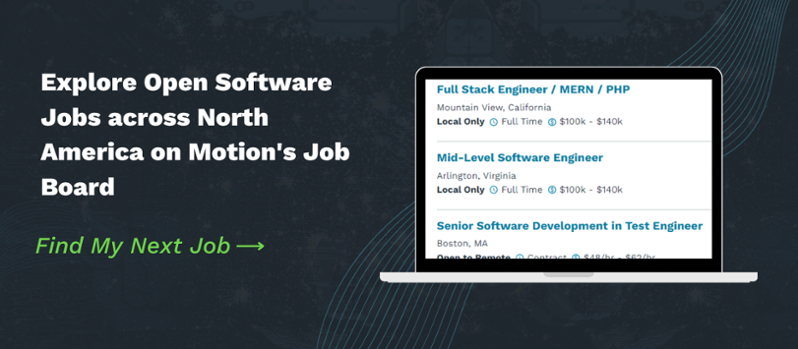8 Ways Artificial Intelligence Will Change the Way Software Developers Work
It’s a question many in the IT industry are asking. Will AI replace the need for human software developers? How soon? In what ways? While AI may very well take over large portions of our technology landscape, it doesn't appear that AI will render software developers extinct any time soon.
Motion Recruitment's community platform Tech in Motion recently held a webinar on the future of AI, where Omar Rahman Salesforce Director, Machine Learning said “AI will empower software developers to evolve to do more. Just like using Google to help you write code, except this is much better with large language models and generative AI. Programmers still need to view the results and understand them. These deeper skills will still be needed.
Additionally, ethics and societal considerations are not easily automated. Victoria Vassileva Director, AI Performance & Responsibility @ Arthur said “There is tremendous complexity around AI models, and human stakeholders must be part of application development because not everything will flag for transparency, governance, or bias. As you ask more complex questions, the need to include human intervention becomes even more critical.”
When it comes to opportunities for developers, the AI landscape seems endless.
From chatbots aiding online shopping experiences to intricate algorithms improving medical diagnoses, the influence of AI can be witnessed across multiple domains.
The beauty of AI lies in its versatility. While traditionally it was the tech and finance industries that were early adopters, today sectors like healthcare, agriculture, entertainment, and even fashion are integrating AI. This wide-ranging applicability means that AI professionals have the freedom to pick and choose the industry that aligns with their personal interests.
AI, by its very nature, is an evolving field. The algorithms, tools, and methodologies today might be vastly different in a couple of years. This ensures that AI developers remain lifelong learners. While some might find these daunting, true enthusiasts will find it incredibly rewarding to be at the cusp of innovation continuously.
Here are some specific areas that will shift or evolve the role of software engineers working with AI.

· Partial Automation of Repetitive Tasks: Many repetitive tasks in software development, such as code generation, bug detection, and even some aspects of system design, are amenable to automation with AI. Tools that leverage AI to assist developers are already being incorporated into development ecosystems.
· AI-Assisted Development: AI can assist developers in various ways, from suggesting better code snippets to predicting where bugs might occur. This doesn't replace developers but augments their capabilities.
· Specialized Tasks: While AI can be trained to write specific types of code or address narrow domains, the breadth and diversity of software applications out there are vast. AI is less effective when it comes to abstract thinking, creativity, or addressing novel problems, areas where human developers excel.
· Human-Machine Collaboration: Just as in other fields, the future of software development may involve more collaboration between humans and AI, leveraging the strengths of both. Developers will shift from mundane aspects of coding to more conceptual, design, and system-level considerations.
· Understanding Requirements: One of the most challenging aspects of software development is understanding the needs and wants of users or clients. Humans are particularly adept at navigating the nuances of human desires, emotions, and unpredictabilities. While AI can assist in this process, fully replacing the human touch in understanding requirements is a distant challenge.
· Ethical and Social Implications: Software development isn't just about writing code; it involves making ethical decisions, understanding the societal impact of a product, and navigating complex user dynamics. These soft skills and ethical considerations are difficult to codify and automate.
· Continuous Learning: The field of software development evolves rapidly. While AI can be trained to keep up with new languages and techniques, human developers are still required to evaluate the appropriateness of these new tools, decide on their adoption, and understand their broader implications.
· Jobs May Shift in Nature: As with many technological advancements, the nature of the job may change rather than the job disappearing entirely. For example, developers might spend less time on boilerplate code and more time on design, architecture, or integrating AI-driven modules.
Just remember, AI is much more than just coding and algorithms. It's about pioneering solutions, continual growth, and navigating the intricate maze of technology, ethics, and human utility. As industries, governments, and societies increasingly rely on AI, professionals in this domain will find themselves at the intersection of technology and its real-world implications.
If you’re looking to learn more about the tech industry and how you can grow your IT career, contact your local Motion Recruitment office. With specialized tech recruiters across the US and Canada, the Motion team can help you find the right job for you and your career. Always free to use for job seekers, contact us today.

.png?width=900&height=150&name=Copy%20of%20Blog%20CTA%20-%20Small%20(32).png)
